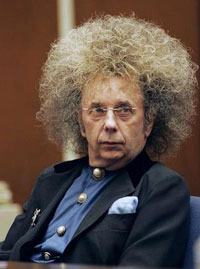Judge in Phil Spector's murder trial takes unusual step
The judge in Phil Spector's murder trial, struggling to help deadlocked jurors reach a verdict, is taking an unusual step that some legal experts say could make a conviction easily reversible on appeal.

With jurors split 7-5, Superior Court Judge Larry Paul Fidler said Wednesday he planned to withdraw a legal instruction that some panelists cited as a point of dispute when they announced the impasse a day earlier. The judge sent the jurors home early on Wednesday and told them to return Thursday.
The instruction concerns the prosecution's theory that Spector held a gun to actress Lana Clarkson's mouth, and that the weapon discharged, causing her death. It says jurors must find Spector committed that act in order to convict him of second-degree murder.
Fidler said he reread the instruction and decided it should not have been given because it misstated the law.
"It sort of takes your breath away," said attorney Harland Braun, who is not involved in the Spector case but has represented Robert Blake and other high profile clients. "I've never heard of withdrawing an instruction after deliberations started."
Spector, 67, is charged with killing Clarkson in his Alhambra mansion on Feb. 3, 2003, a few hours after she met him at her job as a nightclub hostess and went home with him. The defense maintains that Clarkson, 40, was depressed and shot herself, either on purpose or by accident.
Jurors were in their seventh day of deliberations Tuesday when they said they were at an impasse.
The judge offered the defense the opportunity to reargue the case in an effort to break the deadlock, but Spector's lawyers declined, saying it would just give the prosecution a chance to argue a new theory.
The judge also proposed giving jurors an instruction on a new legal option: finding Spector guilty of the lesser crime of involuntary manslaughter. But he rejected that idea Wednesday, saying it might be perceived as telling them what to do.
Later in the day, after questioning the panelists, he decided to withdraw the instruction that was giving them trouble.
Loyola University Law Professor Laurie Levenson called Fidler's plan "a high risk move."
She said jury instructions are "the tea leaves jurors read in reaching their verdicts."
"It would have been proper not to give the instruction in the first place," Levenson said. "It's more problematic to withdraw it. He may be doing it to get a verdict, but the irony is if there's a conviction, we may be trying this case again after it gets to the appellate court."
Attorney Royal Oakes, who has been observing the trial as a legal analyst, said the judge's proposed action "has breathed new life into the prosecution."
"I think the judge is trying to get very creative out of concern for people who have invested five months of their lives in this case," he said.
Oakes said the prosecution case was "on life support" when the jurors returned to report the impasse, but that revisiting the jury instructions "provides an opportunity for the prosecution to achieve victory after all."
Still, he said, it would be difficult at this point for the majority of jurors to change the opinions of five others who have deliberated for this long.
"This may be simply delaying the inevitable hung jury," he said.
Subscribe to Pravda.Ru Telegram channel, Facebook, RSS!


